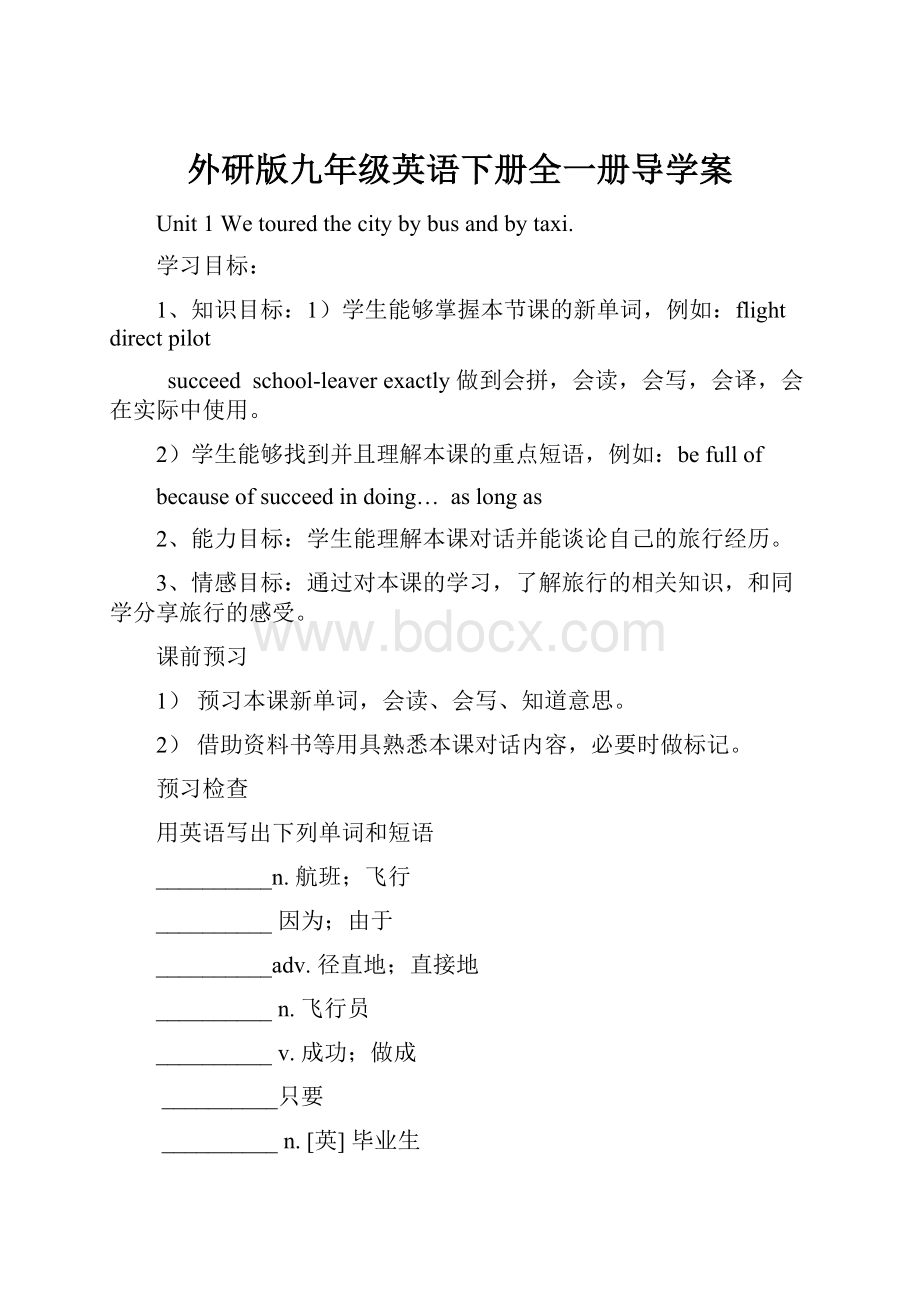外研版九年级英语下册全一册导学案.docx
《外研版九年级英语下册全一册导学案.docx》由会员分享,可在线阅读,更多相关《外研版九年级英语下册全一册导学案.docx(156页珍藏版)》请在冰豆网上搜索。

外研版九年级英语下册全一册导学案
Unit1Wetouredthecitybybusandbytaxi.
学习目标:
1、知识目标:
1)学生能够掌握本节课的新单词,例如:
flightdirectpilot
succeedschool-leaverexactly做到会拼,会读,会写,会译,会在实际中使用。
2)学生能够找到并且理解本课的重点短语,例如:
befullof
because ofsucceedindoing…aslongas
2、能力目标:
学生能理解本课对话并能谈论自己的旅行经历。
3、情感目标:
通过对本课的学习,了解旅行的相关知识,和同学分享旅行的感受。
课前预习
1)预习本课新单词,会读、会写、知道意思。
2)借助资料书等用具熟悉本课对话内容,必要时做标记。
预习检查
用英语写出下列单词和短语
__________n.航班;飞行
__________因为;由于
__________adv.径直地;直接地
__________n.飞行员
__________v.成功;做成
__________只要
__________n.[英]毕业生
__________adv.确切地;完全
课堂练习
一、谈谈你最喜欢的交通方式及原因
A:
What’syourfavouritetypeoftransportation?
Why?
→B:
……
二.听力训练
(一)Listenandcompletethenotes.(Activity2)
1.Theflighttakesabout_______hours.
2.Timedifference(时差):
_______hours
3.Flightnumber:
___________________
4.From________to_________
5.Leaveat(newtime):
_______________
6.Arriveat(newtime):
_________
(二)Listenandanswer(Activity3)
(1)读对话并完成表格填空
Holidayplace
Holidayactivities
Formoftransport
Lingling
Tony
Daming
Betty
(2)回答下列问题
1.Whendoyouthinktheconversationtakesplace?
2.AccordingtoLingling,whyistravelsodifficultinwinter?
3.WhatareDamingandBettylookingforwardtoattheendoftheterm?
(3)选择正确答案
1.Whenyouflydirect,you________.
a)arrivewithoutstoppingatanotherplace
b)stopatanotherplacebeforeyouarrive
2.Whenyousay“Exactly”,itmeans_______.
a)youdonotagree
b)youcompletelyagree
3.Thepilotofaplane________.
a)fliesit
b)givesyoufoodanddrinkduringtheflight
4.Ifyousucceedindoingsomething,you_______.
a)managetodoit
b)nearlydoit
(三)复述对话内容填上合适的单词或短语
1.LinglingwenttoseehergrandparentsinHenanProvinceduringtheholiday.Hertravelwasabit_______,becausewinteristhebusiestseasoninChina_____________theSpringFestival.Thetrain________________peopleandshehadto_____foroverthreehours.
2.TonyspenthisholidayintheUK.He________hisfamilyduringtheholidayandheis___________today.
3.DamingwenttoDisneylandinHongKong.Thoughtheplanleft_______late,thepilot_________________ontime.Andtheyenjoyedthemselvesthere.
4.BettyhadquiteagoodtimeinBeijing.Theytouredthecityby______andby______.Andthey_____________bycoachtotheSummerPalaceandwentfor____________aroundthelake.
(四)语言点分析:
1.befullof意为“充满……;装满……”,其后可接可数名词复数或不可数名词。
同义短语为befilledwith。
例如:
箱子里装满了书。
The box is books.
2.because of意为“因为;由于”,后可接名词、代词或V-ing形式。
例如:
We can’t go out for a walk because of the rain.
因为下雨,我们不能出去散步。
because意为“因为;由于”,是连词,后接句子,常用来回答由why引导的特殊疑问句。
如:
— Why do you get up so early?
—Because I want to catch the early bus.
选用because of或because填空。
(1)She broke the glass __________ her carelessness.
(2)She broke the glass __________ she was careless.
3.succeedindoing…表示“成功地做……”。
例如:
Hesucceededinworkingoutthemathsproblem.
他成功地解出了这道数学题。
WefinallylittleJohnnyupthestairs.
我们最后成功地让小约翰尼上了楼梯。
4.aslongas在这里引导条件状语从句,表示“只要”,也可以用solongas表达同样的意思。
例如:
Youcaninviteyourfriendsas/solongasyoutellmetwodaysbeforetheparty.
你可以邀请朋友来,只要在聚会前两天告诉我就行。
只要你承诺11点以前回来就可以出去。
You can go out you promise to be back before 11 o’clock.
(五)小测
Ⅰ.用方框内所给单词的恰当形式填空。
coachflightsucceed
planeschool-leaver
1.Thefirst_________wasflownbytheWrightbrothersover100yearsago.
2.A_______isalargecomfortablebususedforsightseeingorlong-distancetravel.
3.Willtheheadteacherattendthe___________partynextFriday?
4.It’sonlyaboutfortyminutes’________fromTaiyuantoBeijingbyair.
5.I’msureyouwill______ifyouworkhard.
Ⅱ.根据上句完成下句,使上下句意思相同或相近。
1.WhatwasyourtriptoLondonlike?
____________yourtriptoLondon?
2.TheBlacksenjoyedthemselvesverymuchinHangzhoulastweek.
TheBlacks______________________inHangzhoulastweek.
Ⅲ.根据汉语意思完成下列句子。
1.我们到公园好好走走吧。
Let’s___________________________inthepark.
2.欢迎回来,孩子们!
________________,children!
3.下课时把作业交上来。
Giveinyourhomework_________________________theclass.
Unit2It`salongstory.
学习目标:
1、知识目标:
1)学生能够掌握本节课的新单词和短语,例如:
takecaresirofficer
Stupidtakeoffjacket做到会拼,会读,会写,会译,会在实际中使用。
2)学生能够掌握名词、冠词和数词的用法。
2、能力目标:
学生能理解本课对话并能谈论自己的旅行经历。
3、情感目标:
通过对本课的学习,了解旅行的相关知识,学会乐于助人。
课前预习
3)预习本课新单词,会读、会写、知道意思。
4)借助资料书等用具熟悉本课对话内容,必要时做标记。
预习检查
用英语写出下列单词和短语
(告别用语)多保重
n.先生;长官
n.军官;官员;警察
adj.笨的;糊涂的
脱去
n.短上衣;夹克
课堂练习
一、Freetalk
1.Haveyouevertakenalongjourney?
2.Whatshouldwedobeforealongjourney?
3.Whathappenedduringyourtrip?
4.Wasthereanythingunusualwhichhappenedtoyouduringyourjourney?
5.Haveyoueverbeeninsuchsituations?
Forexample,thetrainwasfullofpeople,yourseatwastakenup….
二、Lookattheexpressionsbelow.Whatdoyouthinktheplaywillbeabout?
Workingroups.Trytomakeaparagraphaccordingtoyourguessing.
1.…getsupandstartsto…
2.…looksforhisticket…
3.…goespastpeople…
4.…getsonthetrain…
三、阅读练习
(一)ReadtheplayandnumbertheexpressionsinActivity1intheordertheyappear.
()1.…getsupandstartsto…
()2.…looksforhisticket…
()3.…goespastpeople…
()4.…getsonthetrain…
(二)Lookthroughtheplayandchoosethecorrectanswer.
1.WhereareLiLinandLiWei?
a)Theyareathome.c)Theyareonthetrain.
b)Theyareattherailwaystation.d)Theyareinacar.
2.WhoisLiWei?
a)SheisLiLin’ssister.c)HeisLiLin’sfather.
b)SheisLiLin’sfriend.d)HeisLiLin’sclassmate
3.WhyistheelderlymansittinginLiLin’sseat?
a)Becausehedidnotbuyaticket.c)Becausehethinksitishisseat.
b)Becauseheistootiredtomove.d)Becausehecannotfindhisseat.
4.Whatdoestheelderlymanwanttodo?
a)Taketheseat.c)ChangeseatswithLiLin.
b)GoandfindCar9.d)Buyanotherticket.
5.WhatdoesLiLindecidetodo?
a)Taketheseatfromtheelderlyman.c)Changeseatswiththeelderlyman.
b)Asktheticketofficerforhelp.d)Getoffthetrain.
6.WhodoesLiLinmeetinCar9?
a)LiWei.c)Hisfriend.
b)Anotherelderlyman.d)Hisclassmate.
(三)Completethepassagewiththewordsandexpressionsinthebox.
afraidmissofficersirtakecaretakeoff
LilinsaysgoodbyetohissisterLiWei.LiLinsaysthathewill
(1)hisfamily,andLiWeitellshimto
(2)WhenLiLingetsonthetrain,heseesanelderlymansittinginhisseat.Hepolitelycallstheelderlyman(3),andsaysheis(4)theelderlymanissittinginhisseat.Theticket(5)arrivesandexplainsthemistake.LiLinkindlyofferstochangeseatswiththeelderlyman,andgoestoCar9.ThereheseeshisfriendWenPeng,whoishappytoseehimandtellshimto(6)hisjacket,sitdownandmakehimselfcomfortable.
四、语言点分析
1.elderly,形容词,是委婉用语,意为“上了年纪的”,外国人一般不说oldman而用elderlyman代替,theelderly泛指老人。
elder指“年长的(尤指家庭成员之间)”,只能修饰人;在句中作定语,不能作表语;elder不能和than连用。
older既可修饰人,也可修饰物;在句中既可作定语,也可作表语;older可以和than连用。
根据句意,用older或elder填空:
Lucy’s brother is two years than her.
2、havesth.ready表示“把某物准备好”。
Wearoomforyou.
我们给您准备了一个房间。
I’ll somebreakfast inafewminutes.
几分钟后我就能做好早饭。
3、take off表示“脱下”,其反义短语是put on穿上。
如:
Please take off your shoes before going into the house.
请你在进家之前脱掉你的鞋。
It’swarmhere.Youmaytakeoffyourcoat.
这里很暖和,你可以把外衣脱下来。
take off还可以表示“起飞”,其反义词是land降落。
如:
The plane took off half an hour ago.
飞机在半小时前起飞了。
用合适的词/短语填空:
Theplanewill _________fromBeijingCapitalAirportandlandinLondon.
五、写作
Writeashortplayaboutatripyouhavemade.Thinkabout:
●whenandwhereyouwent
●howyoutravelled
●whotravelledwithyou
●whathappenedduringthetrip
●howthestoryended
Example:
In2002,IwenttoHongKongbyplanewithmyfamilytogosightseeing.BecauseitwasthefirsttimethatIhadtakentheplane,Ifeltdizzyanduncomfortable.Ididn’twanttoeatanythingbutonlywantedtovomit.WhileIwasnotfeelingwell,theairhostesscametomeandgavemeaplasticbag,acupofwaterandatowel.AfterIvomited,shetookthedirtybagawayandaskedmetohaveagoodrest.Iwasverythankfultoher.Onthetrip,althoughIwasuncomfortable,Iwasveryhappy.
六、小测
(一)翻译短语
1.Saygoodbyeto
2.Geton
3.Have…ready
4.Takecare
5.Waitamoment
6.Gopast
7.Besurprisedto
8.Takeoff
(二)选择适当的单词并用其正确形式完成句子。
elderlystupidsurprisemissjacket
1.YourmamaandIwill_______youatChristmas.
2.I’llneverdoanythingso_______again.
3.Willyoulendmeyour_______forawhile.
4.Thegiftcameasacomplete________tome.
5.That_______ladydiedofoldage.
(三)翻译句子。
1.—今天太热了!
—是的,怎么不脱掉夹克?
(takeoff)
__________________________________
__________________________________
2.我打开了邮件,惊讶地发现了一个打碎的杯子。
(besurprisedto)
__________________________________
___________________________
3.请保持阅览室整洁。
(make)
__________________________________
Module1Unit3
学习目标:
1、知识目标:
1)学生能够掌握名词、冠词和数词的用法
2)了解Concorde相关知识
2、能力目标:
灵活运用本模块的知识点
3、情感目标:
了解旅行的相关知识,学会乐于助人
课堂练习:
一、讲解名词
名词的分类
专有名词:
姓名,国家,语言,月份,星期,节日大学等
名
词个体名词(某类人或东西中的个体)
可数名词
普通名词(有单复数之分)集体名词(若干个个体组成的集合体)
物质名词(自然物质,食品、饮料等)
(无法分为个体的实物)
不可数名词
抽象名词(情感,学科,概念等)
名词的数
Ⅰ.规则变化
构成方法
例词
在词尾加-s
desk–desks
field–fields
sea-seas
1.以s,x,sh,ch结尾的名词后加-es
2.如词尾是e,只加-s
class-classes
box-boxes
horse-horses
以“辅音+o”结尾的名词,加-es
potato-potatoes
tomato–tomatoes
以“元音+o”结尾的名词,加-s
photo-photos
zoo–zoos
词尾为-f或-fe一般变为-ves
knife–knives
Ⅱ.不规则变化
woman→womenman→mentooth→teethchild→childrenox→oxengoose→geese
Ⅲ.单复数同形的单词
fish→fishsheep→sheep
deer→deerChinese→Chinese
注意:
1.一般情况下,复合名词的单复数形式在